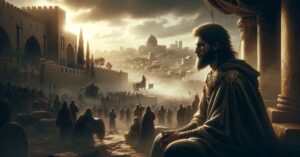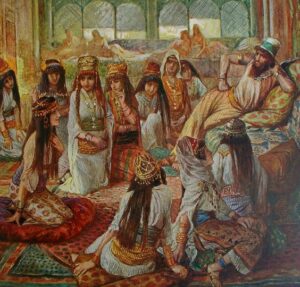Introduction
The story of the Tree of the Knowledge of Good and Evil is one of the most well-known narratives in the Bible. Found in the book of Genesis, this account explains why God forbade Adam and Eve from eating the fruit of this tree. Understanding this story sheds light on fundamental themes of obedience, free will, and the human condition.

The Command in Genesis
In Genesis 2:16-17 (NIV), God commands Adam: “You are free to eat from any tree in the garden; but you must not eat from the tree of the knowledge of good and evil, for when you eat from it you will certainly die.” This directive was clear and came with a dire warning about the consequences of disobedience.
Significance of the Command
- Obedience and Free Will
- God’s command represented the first moral choice for humanity. It tested Adam and Eve’s obedience and trust in God. By giving them free will, God allowed them to choose to follow His will or to act against it.
- Moral Awareness
- Before eating the fruit, Adam and Eve lived in a state of innocence, unaware of the concepts of good and evil. The tree symbolized the knowledge that comes with moral awareness, including the understanding of sin and its consequences.
- Relationship with God
- The prohibition was also a test of their relationship with God. By obeying God’s command, Adam and Eve would demonstrate their trust and reliance on Him. Disobedience would signify a break in this relationship.
The Consequences of Disobedience
When Adam and Eve ate the fruit, their eyes were opened, and they realized they were naked. This newfound awareness brought shame and fear, leading them to hide from God (Genesis 3:7-10). Their disobedience resulted in several consequences:
- Spiritual Death
- The immediate spiritual death was a separation from God. Adam and Eve were banished from the Garden of Eden, symbolizing a loss of intimacy with their Creator.
- Physical Death
- While not immediate, physical death became a part of human existence. The perfect state in which they were created was marred by mortality.
- Introduction of Sin
- Sin entered the world through their disobedience, affecting all of humanity. This act of rebellion introduced suffering, pain, and toil into the human experience.
Modern Interpretations
The story of the Tree of the Knowledge of Good and Evil is rich with symbolism and theological significance. Modern interpretations often explore themes such as:
- Human Responsibility
- The narrative emphasizes human responsibility in making moral choices and the far-reaching impact of those choices.
- Divine Justice and Mercy
- Despite their disobedience, God’s response included both justice and mercy. While Adam and Eve faced the consequences of their actions, God also provided hope for redemption.
- The Nature of Temptation
- The serpent’s role in tempting Eve highlights the cunning nature of temptation and the importance of vigilance and faithfulness to God’s commands.
Conclusion
The command not to eat from the Tree of the Knowledge of Good and Evil is a profound part of the biblical narrative, illustrating essential truths about obedience, free will, and the human condition. Understanding this story helps believers appreciate the depth of God’s love and the importance of following His will. It reminds us of the consequences of disobedience and the hope for redemption through faith.








